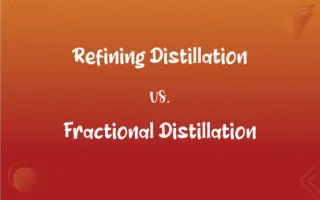Stone vs. Metal: What's the Difference?
Edited by Aimie Carlson || By Janet White || Published on February 12, 2024
Stone is a hard, non-metallic mineral matter; naturally occurring, solid aggregate of minerals. Metal is a typically hard, shiny material, malleable, fusible, and conductive, derived from mineral ores.

Key Differences
Stone refers to a natural, hard substance composed of minerals, often used in construction and sculpture. Metal, on the other hand, is an elemental substance known for its conductivity, malleability, and typically shiny appearance, used in a wide range of industrial applications.
Stone is generally non-metallic and lacks the conductivity and malleability of metals. It's often used in its natural form in architecture and landscaping. In contrast, metal is distinguished by its ability to conduct electricity and heat, and its capacity to be deformed without breaking, used in everything from electronics to transportation.
Stone can be shaped and polished for aesthetic purposes, it does not have the flexible properties of metal. Stones like granite and marble are prized for their durability and beauty in construction. Metal, such as iron or copper, can be melted, cast, and forged, making it integral in machinery and tool production.
Stone is typically extracted from quarries in large blocks and then cut or carved for use. It's integral to various aspects of traditional and modern construction. Metal is derived from ores that require processing and refining to extract the usable material, playing a crucial role in technological advancements.
The use of stone dates back to ancient times for building and tool-making, signifying its long-standing importance in human civilization. Metal, while also used in ancient times, became more prominent with the advent of the Bronze and Iron Ages, revolutionizing tools, weapons, and later industrialization.
ADVERTISEMENT
Comparison Chart
Composition
Non-metallic minerals
Elemental, often from mineral ores
Properties
Hard, non-conductive
Conductive, malleable, often shiny
Uses
Construction, sculpture
Electronics, machinery, construction
Extraction
Quarried in natural form
Extracted from ores, requires refining
Historical Use
Ancient building and tools
Bronze/Iron Ages, industrial advancement
ADVERTISEMENT
Stone and Metal Definitions
Stone
A piece of rock used for a specific purpose.
The building was made of cut stone.
Metal
An element that readily conducts electricity and heat.
Copper is a commonly used metal in wiring.
Stone
A small piece of rock.
She skipped a stone across the water.
Metal
A typically hard, shiny, malleable material.
The sculpture was made of twisted metal.
Stone
A hard seed in certain fruits.
The peach had a large stone in the center.
Metal
A substance derived from mineral ores.
Iron ore is processed to extract the metal.
Stone
Hard, non-metallic mineral matter.
The path was lined with smooth stones.
Metal
A material used for construction and manufacturing.
The bridge is reinforced with strong metal beams.
Stone
A gemstone or precious rock.
The ring was set with a beautiful blue stone.
Metal
A resource used in various industrial applications.
The factory produces metal parts for cars.
Stone
Concreted earthy or mineral matter; rock.
Metal
Any of a category of electropositive elements that usually have a shiny surface, are generally good conductors of heat and electricity, and can be melted or fused, hammered into thin sheets, or drawn into wires. Typical metals form salts with nonmetals, basic oxides with oxygen, and alloys with one another.
Stone
Such concreted matter of a particular type. Often used in combination
Sandstone.
Soapstone.
FAQs
Can metal be melted and reshaped?
Yes, most metals can be melted and reshaped.
Are all stones hard?
Yes, most stones are naturally hard, but their hardness can vary.
Is stone a good conductor of electricity?
No, stone is typically a poor conductor of electricity.
Is metal more durable than stone?
Metal is more malleable and ductile, but stone can be more durable in certain applications.
Can metals be found in their pure form in nature?
Rarely, most metals are found in ores and require processing.
Are stones used in electronic devices?
Not usually; stones are more common in construction and decoration.
Is metal always heavier than stone?
Not necessarily, it depends on the type of metal and stone.
Is granite a type of stone?
Yes, granite is a very hard type of stone.
Can stones be transparent or translucent?
Some stones, like certain gemstones, can be.
Are all metals shiny?
Most metals are shiny when polished, but they can corrode or oxidize.
Are metals recyclable?
Yes, many metals are highly recyclable.
Can metals rust or corrode?
Yes, certain metals can rust or corrode over time.
Can stones be used in making tools?
Yes, stones have been used historically to make tools.
Is marble a stone?
Yes, marble is a type of metamorphic rock, which is a stone.
Can metal be used in jewelry?
Yes, metals like gold and silver are commonly used in jewelry.
Do stones come in various colors?
Yes, stones can be found in a wide range of colors.
Is steel a pure metal?
No, steel is an alloy made from iron and carbon.
Can stones be man-made?
Yes, there are synthetic stones, but natural stones are mined.
Are diamonds considered stones?
Yes, diamonds are a type of gemstone.
Do all metals conduct heat?
Most metals are good conductors of heat, but some are better than others.
About Author
Written by
Janet WhiteJanet White has been an esteemed writer and blogger for Difference Wiki. Holding a Master's degree in Science and Medical Journalism from the prestigious Boston University, she has consistently demonstrated her expertise and passion for her field. When she's not immersed in her work, Janet relishes her time exercising, delving into a good book, and cherishing moments with friends and family.
Edited by
Aimie CarlsonAimie Carlson, holding a master's degree in English literature, is a fervent English language enthusiast. She lends her writing talents to Difference Wiki, a prominent website that specializes in comparisons, offering readers insightful analyses that both captivate and inform.































































